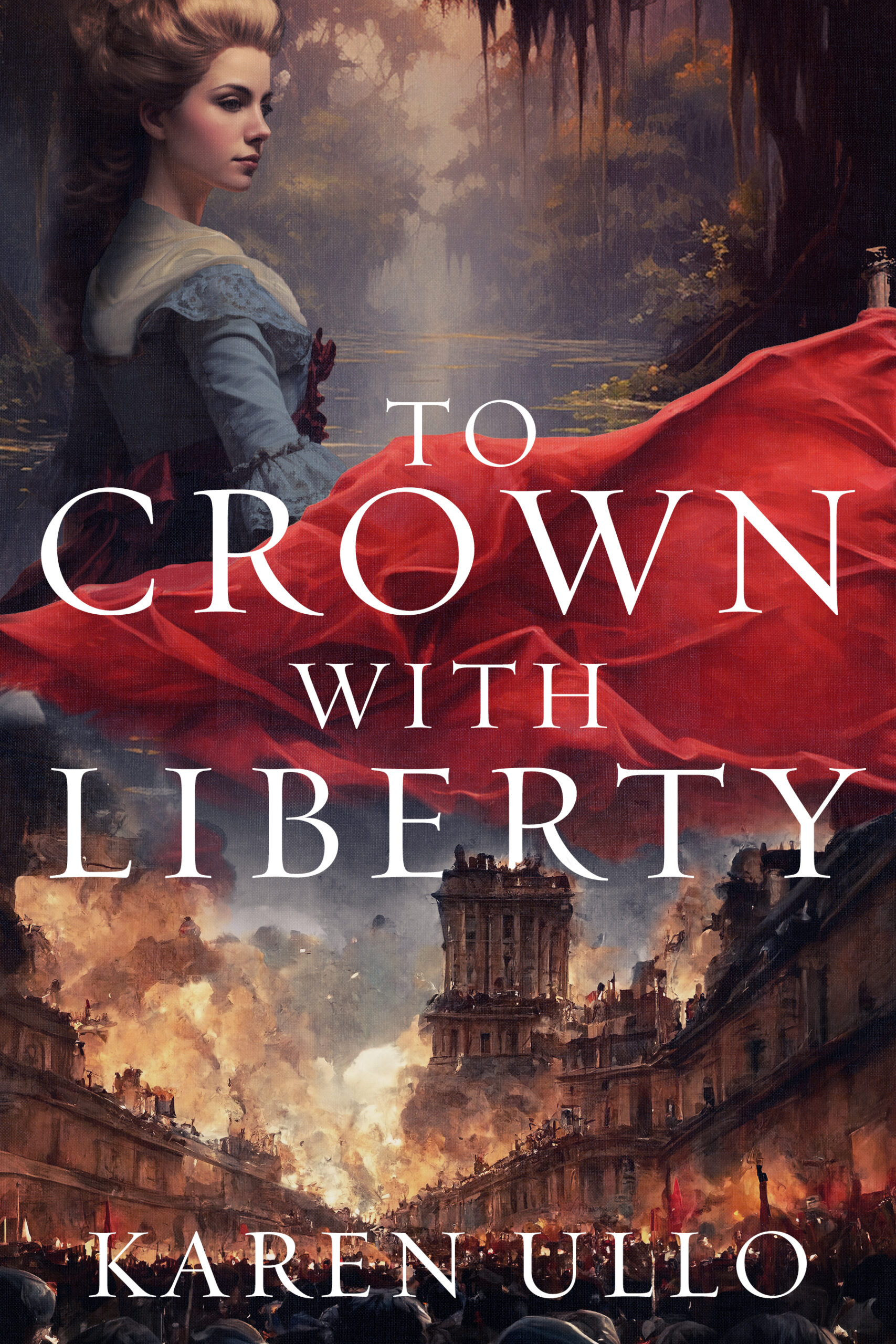


To Crown with Liberty
New Orleans, 1795. In the wake of the French Revolution’s Reign of Terror, Alix de Morainville Carpentier—a former lady-in-waiting to Marie Antoinette, now married to her gardener—seeks peace and security in the Spanish colony of Louisiana. But her journey into the man-eating swamp called Attakapas reopens the wounds of her old life in France. Alix is forced to reckon with the choices that saved her life at the cost of her honor—and perhaps her soul.
In revolutionary France, the Old World is dying; the quest for liberty, equality, and fraternity has become a nightmare where the price of dissent is blood. In the wilderness of Spanish Louisiana, a new civilization is beginning to emerge—but in this budding New World, the slave trade perpetuates the systems of oppression that sparked the revolution. Caught between old and new, scarred by trauma and grief, will Alix ever find a home where she can truly be free?
To Crown with Liberty is a historical novel based on riveting legends from George Washington Cable’s Strange True Stories of Louisiana (1888).
“Ullo brings us a deep and compelling look into tragedy and triumph, loss and love, desperation and determination that showcases the most beautiful and horrible facets of humanity. Never have I seen the French Revolution, and the spirit of those who went on to build a new world for themselves, as fully as in these pages. This is what historical fiction is meant to be!”
“In stepping into the pages of To Crown with Liberty the reader steps into revolutionary France and colonial Louisiana. We find ourselves living among those who are fighting for their lives and struggling with conscience-seducing temptation in times of terror. Ultimately, we find ourselves led into the dark on a quest for light and life.”
Exclusive Excerpt from To Crown with Liberty
The Alençon lace on the tablecloth had torn. I fingered the rough edges of the severed threads. Even if I could find the right materials, I had no skill to recreate such fine stitches. Just as in France herself, I had no power to repair what had been rent.
I sighed and took up my scissors to cut the priceless border from the cream-colored linen. I would sell the lace, then hem the cloth to make it usable again. If misfortune had stolen its glamour, at least its substance still remained.
Joseph entered our little room in the boarding house in the Rue Royal just as the bells of the newly-completed Saint Louis Cathedral tolled five o’clock. His lips curved upward, the lines around them too deep for a man of not quite thirty. “I found work today.”
“Gardening work,” I guessed, seeing his smile. “And in one day, I would wager you have already learned the habits of every plant in Louisiana.”
“All the ones in Madame de Lisas’s garden.” He washed his hands in the basin, then glanced at the torn lace in my hand. He curled his fingers over mine. “Madame de Lisas is a widow, well-educated. Her uncle taught at the Sorbonne. You should come tomorrow. You could both use the company.”
My heart swelled with longing at the prospect of a new friend, but I had put my days of discussing Diderot in fine salons forever behind me. “Joseph, the gardener cannot bring his wife as company for the mistress.”
The light dimmed in his gentle brown eyes.
“Will you go with me to the market? I want to sell the lace before they close.”
He did not chide me that I had had all day in which to go alone. Perhaps he knew how many hours I had spent bouncing like a bagatelle between the window and the door, trying to find the courage to face the city. I did not belong here; I could sense it in my bones. The world where I belonged had died, and it still sought to consume me in its decay.
I knew Joseph could read the darkness on my face, the blight of my own mind. But he only said, “Of course,” and retrieved his hat from its peg.
I tucked the lace into my pocket, then draped a shawl to cover my head and my hunched shoulder. I’d had several of my mother’s dresses remade for me in England in the new, high-waisted style, without trains, so I could walk the streets of the tropics without dragging the costly fabric through the mud. Yet the fine weave of the muslin and the bright blue charmeuse silk of the shawl still marked me as la comtesse, and I owned nothing plainer.
The wooden banquettes that lined the mud pits New Orleans called streets echoed under our shoes. The shopkeepers stepped out to lock their doors while the taverniers flung theirs wide. Joseph pulled me close as a young boy ran past, heedless of anything but speed. I had been like him once—footloose, carefree. I hadn’t always jumped at shadows. But the shadows had not always stretched across continents and oceans.
“This is not France, Alix,” Joseph whispered. “We’re safe.” He led me on.
This was not France—not Orléans—though it still bore the name given by its French founders. Since the end of the Seven Years’ War, Louisiana had been Spanish land, though it was even less like Spain. Here, the royal House of Bourbon, cousins of my beloved departed king, still ruled a French-speaking populace. It had sounded like a place where we might find welcome.
Instead, this was truly a New World: unpredictable, untamed. The Cabildo next to the cathedral, meant to serve as City Hall, might echo something of Old World grandeur when it was complete, but for now it was merely scaffolding and timber. The would-be city teemed with foreign tongues and foreign faces, ships built more solidly than houses. New Orleans was a port where all the world came to trade, but only those like us—those with no true home—ever meant to stay.
